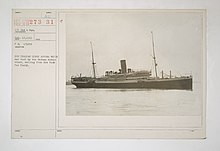SS Ancona
SS Ancona was an ocean liner, built in 1908 by Workman, Clark and Company of Belfast for the Societa di Navigazione a Vapore Italia of Genoa.
In 1907 and 1908 shipyards in Scotland and Ireland built three sister ships for the Italia Società di Navigazione a Vapore's route between Genoa and Philadelphia via Naples and New York.
[5][2] On 28 February 1908, after successful completion of her speed trials on the Skelmorlie measured mile, Ancona, while coming up the Lough on her return trip from the Clyde to Liverpool, hit in the stern and sank Harbour Commissioners' twin screw tug Musgrave.
On her return journey on 23 April, Ancona boarded 910 people in New York and 1,343 in Philadelphia for a total of 2,253 passengers heading to Italy.
[10] When World War I broke out in August 1914, Italy at first stayed neutral, but many Italians travelled from America back to their home country, many of them on Ancona.
Ancona started her final eastward transatlantic voyage from New York for Naples on 16 October 1915 carrying 1,245 Italian reservists and about 5,000 tons of general cargo, including flour, beef and other provisions.
On Monday, 8 November, when Ancona was off Cape Carbonara, Sardinia U-38 sighted her at 38°14′N 10°08′E / 38.233°N 10.133°E / 38.233; 10.133, gave chase and fired about 100 rounds at the liner.
[14] After some delay Austria admitted that its submarine commander exceeded his orders, but stated in extenuation of his action that he believed Ancona to have been a troopship.
Germany, then concerned to maintain American neutrality, advised Burián to accede to the US demands, and Vienna eventually agreed to pay an indemnity and assured Washington that the U-boat commander would be punished, although this was a meaningless promise since he was a German officer.
After the settlement of the affair, the Austro-Hungarian government requested that German submarines refrain from attacking passenger vessels while flying the Austrian flag.
[14] Burián's diplomatic accession to American demands angered Grand Admiral Anton Haus, commander of the Austro-Hungarian Navy, who had advocated taking a hard line after the sinking.
